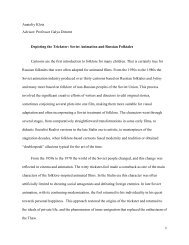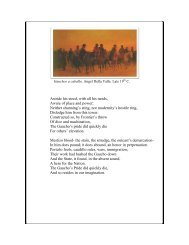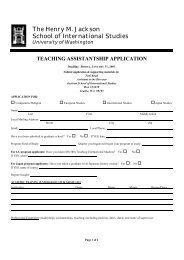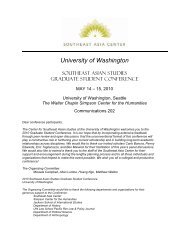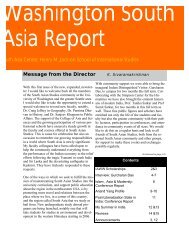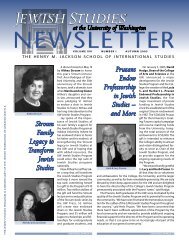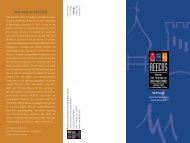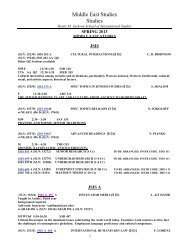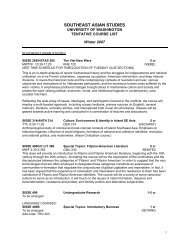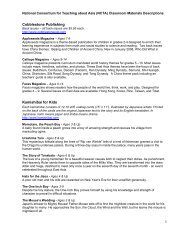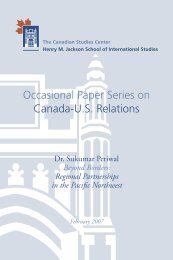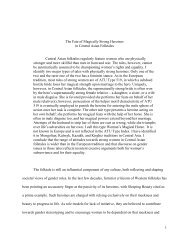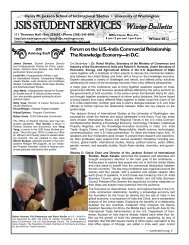jewish studies jewish studies - Jackson School of International ...
jewish studies jewish studies - Jackson School of International ...
jewish studies jewish studies - Jackson School of International ...
You also want an ePaper? Increase the reach of your titles
YUMPU automatically turns print PDFs into web optimized ePapers that Google loves.
“FACULTY NEWS” CONTINUED FROM PAGE 4<br />
NW program and served as Graduate Program Advisor in the<br />
Near East Department.<br />
Pr<strong>of</strong>essor Robert Stacey finished his five-year term as Chair<br />
<strong>of</strong> the History Department in July 2002. During the past year,<br />
he has been on leave, returning to his study <strong>of</strong> ritual crucifixion<br />
stories in medieval England, and preparing a revised<br />
edition <strong>of</strong> his western civilization textbook.<br />
Pr<strong>of</strong>essor Sarah Abrevaya Stein taught a new graduate<br />
course entitled “Topics in Modern European Jewish History”<br />
and, for the second time, taught an undergraduate lecture<br />
course “The Jewish Twentieth Century in Film.” During this<br />
academic year, she will co-teach three new courses, two with<br />
Dr. Uta Poiger on the history <strong>of</strong> the Holocaust. Pr<strong>of</strong>essor Stein<br />
addressed the wider Seattle community several times in<br />
recent months, including a talk given as part <strong>of</strong> the Seattle<br />
Jewish Film Festival. Her most recent work appears in the journals<br />
Pe’amim, Studies in the Cultural Heritage <strong>of</strong> Oriental Jewry<br />
and Slavic Review, and in various edited volumes, among them<br />
Boundaries and Belonging (Cambridge University Press, 2003)<br />
and The Oxford Handbook <strong>of</strong> Jewish Studies (Oxford University<br />
Press, 2002). Pr<strong>of</strong>essor Stein is currently co-editing, with Dr.<br />
Resat Kasaba, a volume entitled Coexistence and Conflict in<br />
Ottoman Society. Her book, Making Jews Modern: Yiddish and<br />
Ladino Press in the Russian and Ottoman Empires, is being published<br />
this year by Indiana University Press. She is currently at<br />
work on a new book project that explores European Jews’<br />
role in the colonization <strong>of</strong> sub Saharan Africa.<br />
Pr<strong>of</strong>essor Brannon Wheeler, with Scott Noegel and Joel<br />
Walker, edited the papers for publication, presented at the<br />
UW conference on “Prayer, Magic and the Stars” (Penn State<br />
Press). His book, Moses in the Quran and Islamic Exegesis<br />
(Curzon Routledge) was published last summer; his edited<br />
volume, Teaching Islam (Oxford), appeared in January 2003.<br />
His work appears in the published volumes <strong>of</strong> the<br />
Encyclopaedia <strong>of</strong> the Quran (E. J. Brill), the Oxford Dictionary<br />
<strong>of</strong> Islam (Oxford), and an article is forthcoming in the second<br />
edition <strong>of</strong> the Encyclopedia <strong>of</strong> Religion (Macmillan). In addition<br />
to several published articles, he contributed a paper to<br />
a conference on Islamic Law and Sufism in Murcia, Spain.<br />
Pr<strong>of</strong>essor Wheeler concludes his second three-year term as<br />
editor for Religious Studies Review, and has plans to launch a<br />
new journal in Comparative Islamic Studies to be published<br />
by Leicester University Press. He also continues work on the<br />
editing <strong>of</strong> the Dictionary <strong>of</strong> Muslim Biographies (Continuum),<br />
and his book-length manuscript on “Ritual, Relics, and Territory<br />
in Islam.” During the summer and fall 2003, he will<br />
be a Fellow at the Institute for Ismaili Studies in London, the<br />
Oxford Centre for Islamic Studies, and a visiting scholar at<br />
the <strong>School</strong> <strong>of</strong> Oriental and African Studies at the University<br />
<strong>of</strong> London. Pr<strong>of</strong>essor Wheeler received a Senior Fellowship<br />
at the American Centers for Oriental Research in Amman,<br />
Jordan for 2004, and will also be conducting research on<br />
the Arab Prophets <strong>of</strong> the Quran and Bible with a Fulbright<br />
research Fellowship in Jordan, Egypt, and Saudi Arabia during<br />
that same time. This coincides with his chairmanship <strong>of</strong><br />
a new section in the Society <strong>of</strong> Biblical Literature, “On the<br />
Quran and Biblical Literature.”<br />
Visiting Faculty<br />
The Jewish Studies Program is very pleased to have two<br />
visiting faculty for the 2003–2004 academic year. The program<br />
welcomes Hazel D. Cole Fellow, Alisa Braun (see article<br />
page 8), and Shlomo Chertok.<br />
Shlomo Chertok received an M.A. in Jewish Studies at the<br />
University <strong>of</strong> Chicago and is currently completing a Ph.D. in<br />
Jewish Thought in Modern Jewish Intellectual History at Ben-<br />
Gurion University <strong>of</strong> the Negev, Israel. In addition, he has broad<br />
training in the History <strong>of</strong> Jewish Biblical Interpretation and the<br />
Jewish Philosophical Tradition. Chertok will be teaching “The<br />
Jews in Western Civilization,” Winter 2004, and Beginning<br />
Modern Hebrew through UW Extension beginning Fall 2003.<br />
Joel Migdal Becomes President <strong>of</strong> AIS<br />
Pr<strong>of</strong>essor Joel Migdal has made<br />
the UW the center for two important<br />
undertakings.<br />
In May, he became the two-year<br />
president <strong>of</strong> the Association for<br />
Israel Studies (AIS). AIS, an international<br />
organization <strong>of</strong> academics<br />
and others researching and teaching<br />
on Israel, has members in<br />
North America, Europe, and Israel.<br />
The website is http://www.gc.cuny.<br />
edu/directories/faculty/S.htm. Pr<strong>of</strong>essor Migdal<br />
Migdal also has been appointed<br />
the first editor <strong>of</strong> a new book series, Studies on Israel,<br />
to be published by the University <strong>of</strong> Wisconsin Press.<br />
He expects the first books in the series to appear in<br />
late 2004 or 2005.<br />
How to Find UW Courses in Jewish Studies<br />
“Where do I find Jewish Studies courses?”<br />
This is a commonly asked question. Not every<br />
course related to Jewish Studies is listed under “Jewish<br />
Studies” in the time schedule. Courses in Hebrew language,<br />
Jewish History, Judaism (religion), and the Bible,<br />
for instance, are <strong>of</strong>fered through other departments<br />
and programs.<br />
The faculty members <strong>of</strong>fering these courses have,<br />
since the founding <strong>of</strong> the Jewish Studies Program,<br />
volunteered many administrative hours to coordinate<br />
the Jewish Studies curriculum. It is comprised primarily<br />
<strong>of</strong> courses in Near East Languages and Civilization,<br />
Comparative Religion, History, English and, occasionally,<br />
programs such as <strong>International</strong> Studies.<br />
Therefore, to find courses directly related to Jewish<br />
Studies, it is imperative to check the UW Time Schedule<br />
for the following rubrics: NE, HSTAM, HSTAA, RELIG,<br />
HEBR, HIST, ENGL.<br />
5



